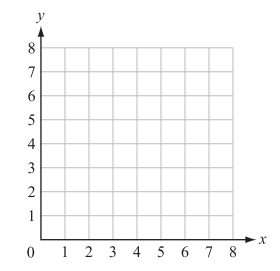All ISEE Lower Level Math Resources
Example Questions
Example Question #1 : Geometry
A coordinate plane is shown.

Ralph plotted the following points on the coordinate grid:
Point W (2, 1); Point X (2, 6); Point Y (5, 1); Point Z (5, 6)
A polygon is formed with vertices W, X, Y, and Z. Which type of polygon is formed?
Square
Trapezoid
Rectangle
Rhombus
Rectangle
Start by plotting the vertices and connecting them to form a quadrilateral.

The created figure has 4 right angles. This can describe a rhombus, square, and rectangle. Because the sides are not all the same length, the figure must be a rectangle.
Example Question #1 : Geometry
A coordinate plane is shown.

Ralph plotted the following points on the coordinate grid:
Point W (0, 0); Point X (7, 0); Point Y (7, 5); Point Z (0, 5)
A polygon is formed with vertices W, X, Y, and Z. Which type of polygon is formed?
Trapezoid
Kite
Triangle
Rectangle
Rectangle
Start by plotting the vertices and connecting them to form a quadrilateral.

The figure that is created has four right angles. Out of the given answer choices, this can only describe a rectangle.
Example Question #3 : How To Find A Rectangle On A Coordinate Plane
A shape is plotted on a coordinate plane using the following points: 



There is not enough information to determine the shape.
Triangle
Square
Trapezoid
Rectangle
Rectangle
If you plot these points on a coordinate plane, the shape has four sides and opposite sides are equal and parallel, but all sides are not equal.
Therefore, it is a rectangle.
Example Question #1 : Geometry
A shape with points 



Triangle
Trapezoid
Prism
Square
Rectangle
Square
Since each side is equal to each other, the shape must be a square.
Example Question #1 : How To Find A Square On A Coordinate Plane
A coordinate plane is shown.

Ralph plotted the following points on the coordinate grid:
Point W (5, 5); Point X (0, 5); Point Y (0, 0); Point Z (5, 0)
A polygon is formed with vertices W, X, Y, and Z. Which type of polygon is formed?
Triangle
Square
Trapezoid
Kite
Square
Start by plotting and connecting the vertices to create a quadrilateral.

The figure that is created has 4 right angles and sides of equal length. The only answer choice that shares these characteristics is the square.
Example Question #1 : Coordinate Geometry
A square is plotted on a coordinate plane. It includes the following points: 
Each of the points is written as an ordered pair. The first number in each ordered pair shows where the point is located on the x-axis. The second number in each ordered pair shows where the point is located on the y-axis. If you plot the ordered pairs listed in the problem, the ordered pair that is needed to complete the points of a square is 
Example Question #1 : Geometry
A coordinate plane is shown.

Ralph plotted the following points on the coordinate grid:
Point W (3, 3); Point X (3, 8); Point Y (8, 3); Point Z (8, 8)
A polygon is formed with vertices W, X, Y, and Z. Which type of polygon is formed?
Trapezoid
Square
Pentagon
Triangle
Square
Start by plotting and connecting the vertices to create a quadrilateral.

The figure that is created has 4 right angles and sides of equal length. The only answer choice that shares these characteristics is the square.
Example Question #7 : Coordinate Geometry

Renee plotted the following points in quadrant one on the coordinate grid:
Point A = (2,2)
Point B = (7,2)
Point C= (7,7)
Where in Quadrant one of the coordinate grid would Renee have to plot Point D so that the points form a square with vertices A, B, C, and D, and forms sides AB, BC, CD, and DA?
Once Points A,B, and C have been plotted the missing coordinates in order to form a square (all sides being equal), Point D would be (2,7). All coordinates (x,y) in Quadrant one will be positive integers.
Another approach is to calculate the distance between each point.
When Point A and Point B are plotted they form a horizontal line that goes from 2 to 7. That makes the distance 
When Point B and Point C are plotted they form a vertical line that goes from 2 to 7. That makes the distance 
Point C creates a vertical line with Point B. That makes the distance 
From here, we want to find a point that is horizontally 5 units from Point C and vertically 5 units from Point A. Thus (2,7) is the correct answer.
Example Question #2 : Geometry
A square is plotted on a coordinate plane. It includes the following points: 
Each of the points is written as an ordered pair. The first number in each ordered pair shows where the point is located on the x-axis. The second number in each ordered pair shows where the point is located on the y-axis. If you plot the ordered pairs listed in the problem, the ordered pair that is needed to complete the points of a square is 
Example Question #3 : Geometry
In which quadrant is the point 

From the origin 
Certified Tutor
All ISEE Lower Level Math Resources






















